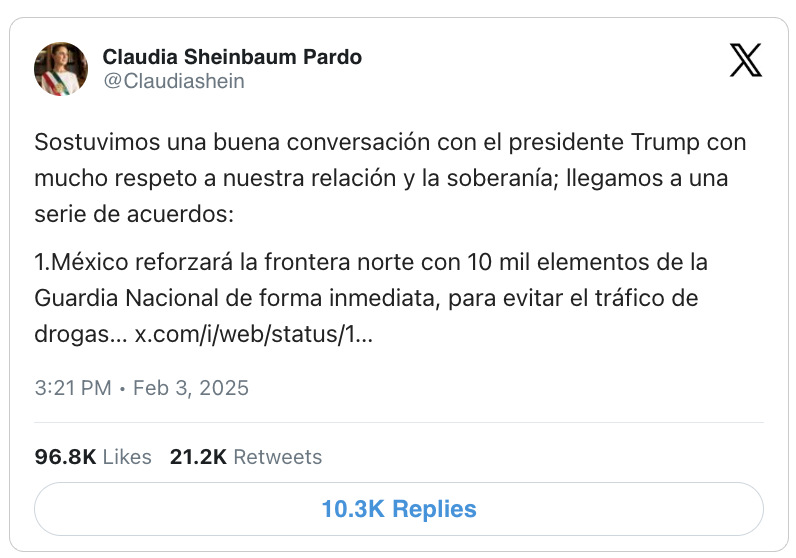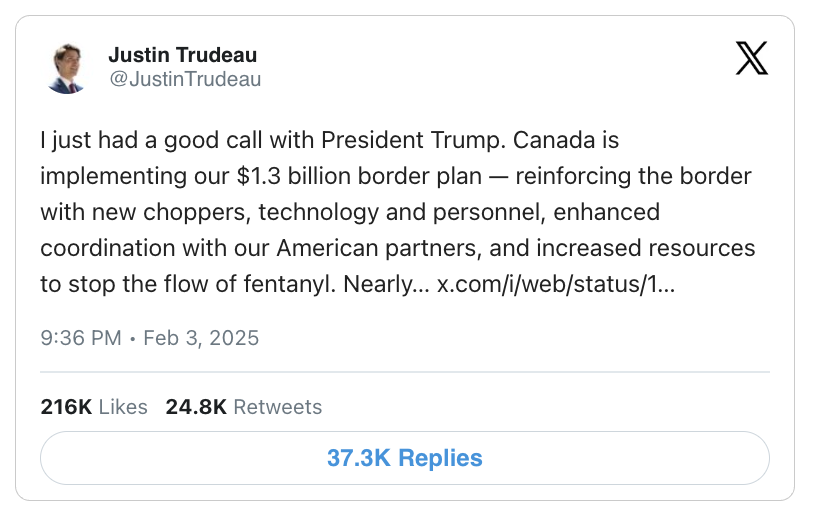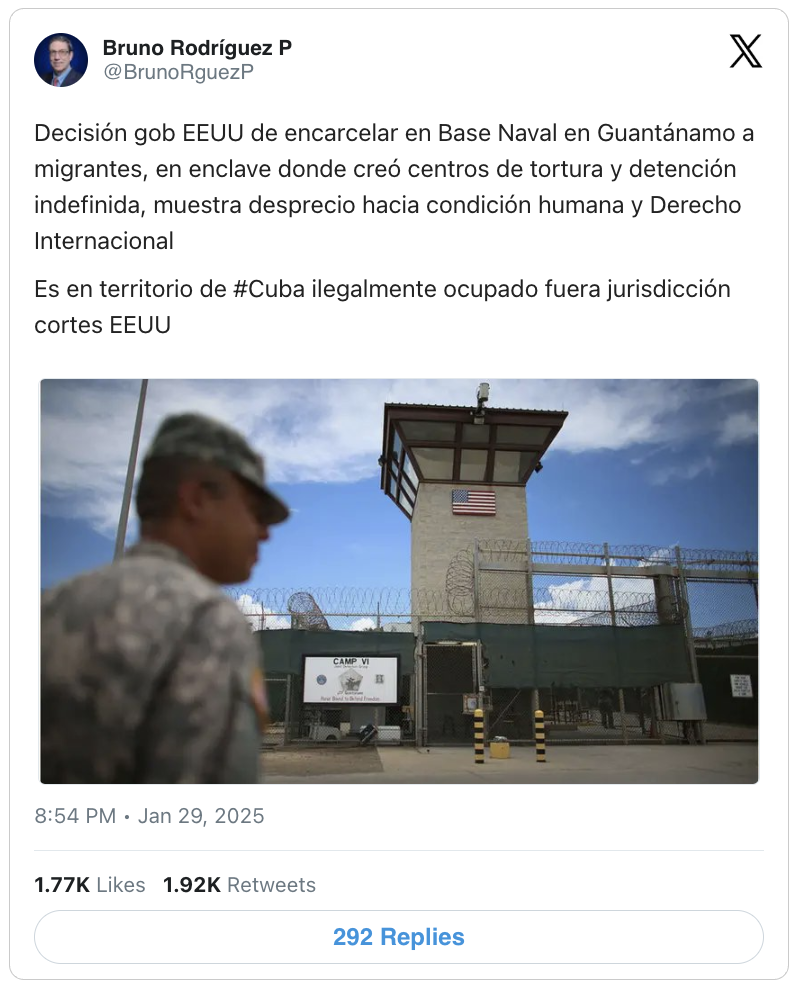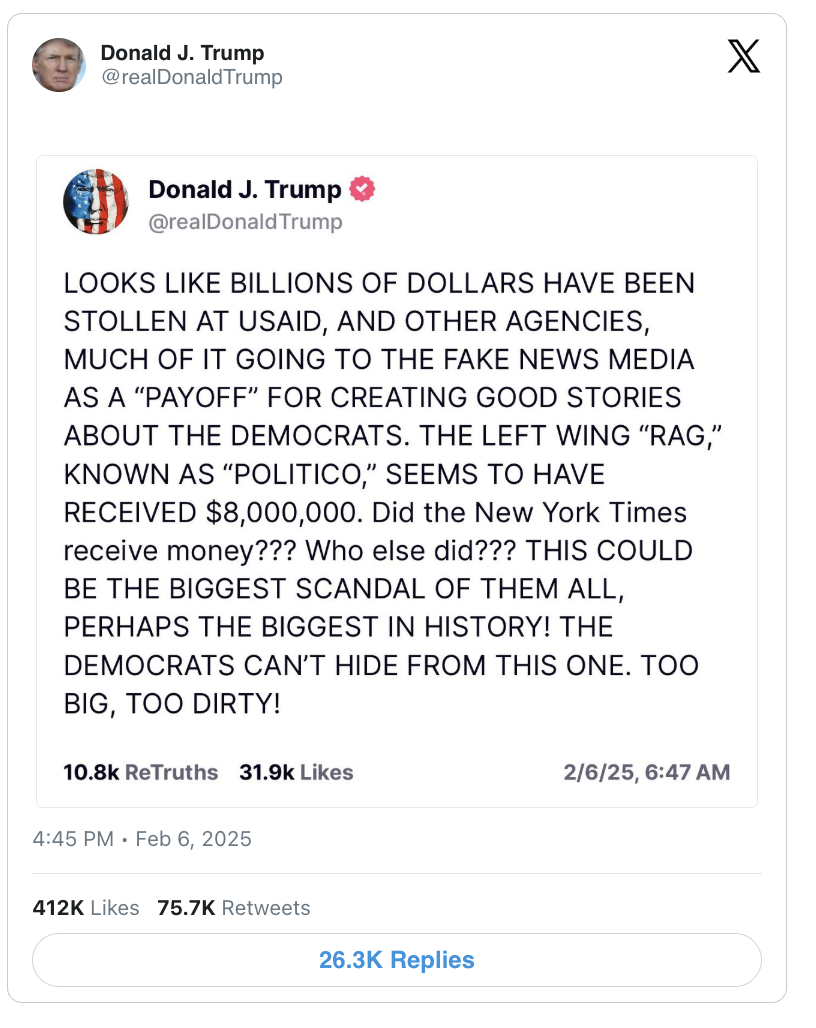Truth vs Trumponomics 2.0
What has President Trump said this week?
〰️
What has President Trump said this week? 〰️
1. Tariffs on Mexican and Canadian Imports Paused for One Month
Following a conversation between U.S. President Donald Trump and Mexican President Claudia Sheinbaum on Monday, February 3rd, both leaders agreed to temporarily suspend the planned 25% tariffs on Mexican imports, which were set to take effect at midnight on February 4th.
As part of the agreement, President Sheinbaum committed to deploying 10,000 members of the National Guard to curb the flow of fentanyl from Mexico into the United States and to enhance border security efforts. In a statement, President Trump also noted that Mexico would take additional steps to prevent illegal immigration. Meanwhile, President Sheinbaum announced that the U.S. has agreed to collaborate on reducing the trafficking of high-powered weapons into Mexico.
Similarly, tariffs on Canadian imports will be postponed due to the implementation of a $1.3 billion border initiative aimed at reducing fentanyl trafficking. The plan includes new technology, additional personnel at border crossings, and coordinated efforts to combat organized crime, fentanyl distribution, and money laundering.
The temporary suspension of tariffs provides a window for further negotiations on trade and security cooperation between the three countries.
2. Trump Signs Executive Order to Adapt Guantánamo Bay to Detain High-Priority Criminal Migrants
On Wednesday, January 29th, President Donald Trump signed an executive order directing the expansion of Naval Station Guantánamo Bay to its full capacity to accommodate what he describes as "the worst criminal illegal aliens threatening the American people." The order states that the facility will provide additional detention space for high-priority criminal migrants unlawfully present in the United States, with Trump claiming it has 30,000 available beds.
The decision faces significant legal, logistical, and human rights challenges, particularly given the status of Guantánamo Bay as Cuban territory under U.S. Supreme Court precedent. Current international and migration laws prohibit the transfer of foreign nationals to the facility without Cuba's consent (Politico, 2025). Additionally, concerns over costs, legal jurisdiction, and detainee rights further complicate the implementation of this directive.
Cuban Minister of Foreign Affairs, Bruno Rodríguez Parrilla, strongly condemned the move, stating on X (formerly Twitter) that the U.S. decision to detain migrants "in an enclave where it created torture and indefinite detention centers" demonstrates "contempt for human dignity and International Law." He further asserted that the territory remains "outside the jurisdiction of U.S. courts."
The executive order is expected to face legal challenges and diplomatic tensions as it moves forward.
3. Trump Claims the U.S. Doesn’t Need Canada, Data Tells a Different Story
Speaking at the World Economic Forum in Davos, President Donald Trump dismissed Canada’s economic significance to the United States, stating, "We don’t need them to make our cars, we make a lot of them. We don’t need their lumber because we have our own forests... We don’t need their oil and gas, we have more than anybody."
However, data from the U.S. Energy Information Administration (EIA) contradicts this claim. In 2024, the agency reported that Canada remains the largest single source of U.S. petroleum and crude oil imports. In 2022 alone, Canada supplied 52% of total U.S. petroleum imports and 60% of crude oil imports, far outpacing Mexico, the second-largest supplier.
Alberta Premier Danielle Smith responded to Trump’s comments, warning that a 25% tariff on Canadian products—a measure Trump has previously considered—would significantly impact U.S. consumers. "Americans will pay a lot more for gas," she stated, arguing that the U.S.’s high demand for oil and limited supply sources contradict Trump’s assertion that the country can afford to cut off Canadian imports.
With energy prices already a key concern for American voters, the economic and political implications of Trump's stance on Canada are likely to remain a contentious issue.
4. Trump Alleges USAID Funds Stolen
On Thursday, February 6th, President Donald Trump took to X (formerly Twitter) to accuse the United States Agency for International Development (USAID) of funneling billions of taxpayer dollars to media outlets as a political “payoff.” In his post, Trump singled out Politico, alleging it received $8 million, and questioned whether The New York Times had also been a recipient:
Despite the bold claims, no evidence has been presented to substantiate them. The White House recently published a list of alleged "waste and abuse" of taxpayer funds through USAID projects, reinforcing Trump’s long-standing opposition to international spending. However, The Dispatch (2025) reported that USAID’s actual payments to Politico amounted to just $44,000 over two years, covering information subscriptions—far from the alleged multi-million-dollar figure.
Meanwhile, Elon Musk, now leading the newly created Department of Government Efficiency (DOGE), is pushing for deep federal budget cuts, with USAID as a primary target. According to BBC (2025), Musk is considering the agency’s closure, aligning with Trump’s broader effort to reduce international aid spending.
With investigations likely to follow, the controversy adds another layer to ongoing debates over media credibility, government transparency, and the future of U.S. foreign aid.





